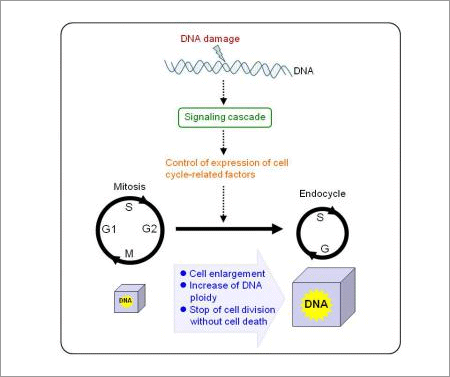Research outcomes
Programmed induction of endoreduplication by DNA damage in plants
Professor Masaaki Umeda and his team members have discovered that plants undergo a programmed endoreduplicative response to genotoxic stress. Endoreduplicated cells display increased cell size and DNA ploidy without cell division; thus this mechanism prevents DNA-damaged cells from proliferating and also from dying. Because plant cells, unlike animal cells, cannot migrate within tissues, cell death usually leaves behind an opening in the local tissue structure. Plants may therefore have acquired the strategy of actively inducing endoreduplication to prevent such gaps from arising in damaged tissue, and to sustain growth under genotoxic stress. This finding will be applied to breeding plants with enhanced tolerance to environmental stress and to an increase in plant biomass by modulating organ size.
This study appeared in Proceedings of the National Academy of Sciences of the United States of America, and can be accessed by clicking on the following link:
http://www.ncbi.nlm.nih.gov/pubmed/21613568

Related link
The paper is published in the Journal below.
http://dx.doi.org/10.1073/pnas.1103584108
http://library.naist.jp/dspace/handle/10061/6334 (NAIST Academic Repository: naistar)
Here is the bibliographic information of the paper.
Adachi, Sumiko; Minamisawa, Kazunori; Okushima, Yoko; Inagaki, Soichi; Yoshiyama, Kaoru; Kondou, Youichi; Kaminuma, Eli; Kawashima, Mika; Toyoda, Tetsuro; Matsui, Minami; Kurihara, Daisuke; Matsunaga, Sachihiro; Umeda, Masaaki. Programmed induction of endoreduplication by DNA double-strand breaks in Arabidopsis. PROCEEDINGS OF THE NATIONAL ACADEMY OF SCIENCES OF THE UNITED STATES OF AMERICA. 24 May 2011
[ Press Release ] May 24, 2011
( May 24, 2011 )
